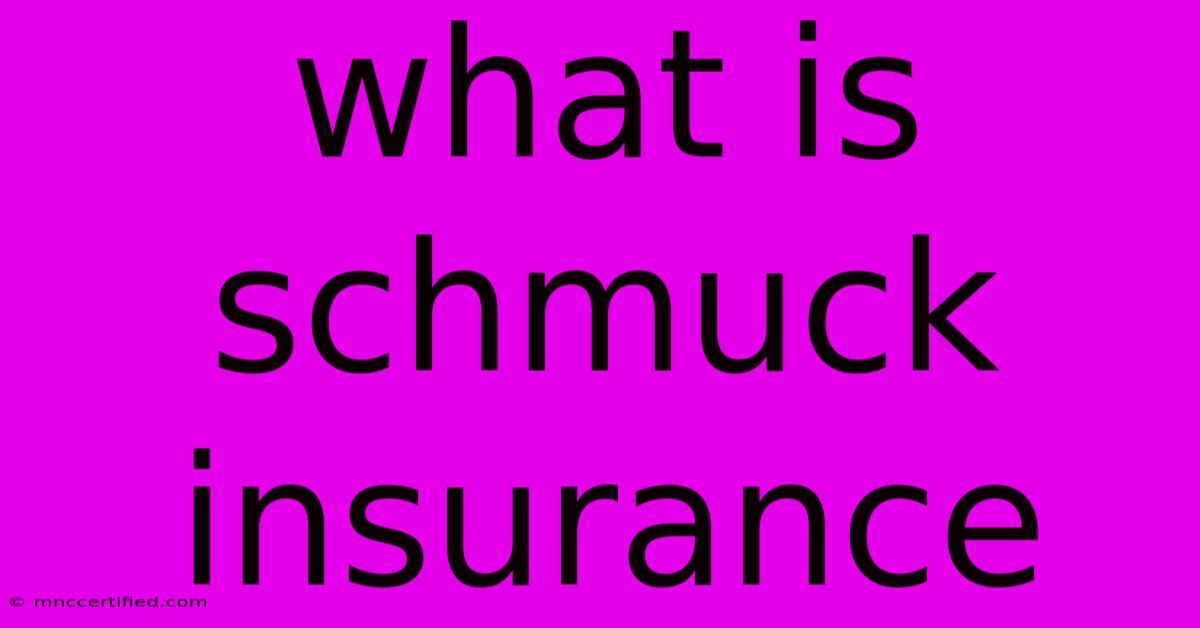What Is Schmuck Insurance

Table of Contents
What is Schmuck Insurance? Understanding the Fine Print and Protecting Yourself
"Schmuck insurance" isn't an official insurance term you'll find in policy documents. Instead, it's slang, often used informally to describe insurance policies that seem to offer little to no real protection or that are filled with confusing exclusions and loopholes. This article will explore what people commonly mean when they use this term, focusing on identifying potentially problematic insurance policies and offering advice on how to avoid becoming a victim of inadequate coverage.
Decoding the "Schmuck Insurance" Label: What Makes a Policy Inadequate?
The term "schmuck insurance" typically highlights several key characteristics of a poor insurance policy:
-
High Premiums, Low Coverage: This is a classic red flag. You're paying a significant amount for a policy that offers minimal payouts in the event of a claim. The cost far outweighs the actual protection.
-
Excessively Restrictive Exclusions: Many policies contain exclusions, which are specific events or circumstances that the insurance company won't cover. A "schmuck" policy often has an extensive list of exclusions, severely limiting the situations where you can actually make a claim. Look out for incredibly specific exclusions that seem designed to deny claims.
-
Complex and Confusing Language: Insurance policies are notorious for being dense and difficult to understand. However, a policy deliberately designed to be confusing, using jargon and ambiguous phrasing, is a major warning sign. If you can't understand the policy, it's likely designed to make it harder to claim.
-
Hidden Fees and Charges: Unexpected fees and charges can quickly erode the value of your insurance coverage. Be sure to thoroughly read the policy documents to identify any hidden costs.
-
Lengthy Claims Process: A policy with a notoriously difficult and time-consuming claims process is another indicator of a potentially poor policy. If claiming is deliberately made difficult, it's a sign the insurer isn't eager to pay out.
-
Negative Online Reviews: Before purchasing any insurance, check online reviews from other consumers. Negative feedback about claims handling, payout amounts, or deceptive practices should raise significant concerns.
How to Avoid "Schmuck Insurance": Tips for Choosing the Right Policy
Protecting yourself from inadequate coverage requires careful research and due diligence. Here are some essential tips:
-
Compare Multiple Quotes: Don't settle for the first quote you receive. Compare several quotes from different insurers to find the best balance between price and coverage.
-
Read the Fine Print Carefully: This is crucial. Don't just skim the policy document; read it thoroughly, paying close attention to exclusions, limitations, and conditions. If needed, seek professional help to understand complex terms.
-
Ask Questions: If something is unclear, don't hesitate to contact the insurer and ask for clarification. A reputable company will be happy to answer your questions.
-
Check the Insurer's Reputation: Research the insurer's financial stability and customer service record. Look for independent ratings and reviews to gauge their trustworthiness.
-
Consider Independent Advice: Consult with an independent insurance broker. They can offer unbiased advice and help you compare different policies.
Beyond the Label: Focusing on Genuine Protection
The term "schmuck insurance" serves as a cautionary tale. While it’s informal, it highlights the importance of being a savvy consumer when it comes to insurance. By understanding the red flags and following the tips outlined above, you can significantly reduce the risk of purchasing inadequate coverage and ensure you have the genuine protection you need. Remember, the goal isn't simply to find the cheapest policy but to find the policy that provides the best value for your specific needs and circumstances.

Thank you for visiting our website wich cover about What Is Schmuck Insurance. We hope the information provided has been useful to you. Feel free to contact us if you have any questions or need further assistance. See you next time and dont miss to bookmark.
Featured Posts
-
Potter Open To West Ham Interim Role
Dec 10, 2024
-
Atletico Madrid Faces Marbella Fc
Dec 10, 2024
-
Epic Games Pays Fortnite Players 100
Dec 10, 2024
-
Coote Sacked Second Incident Klopp Fallout
Dec 10, 2024
-
Live Golden Globes 2025 Nominations Announced
Dec 10, 2024